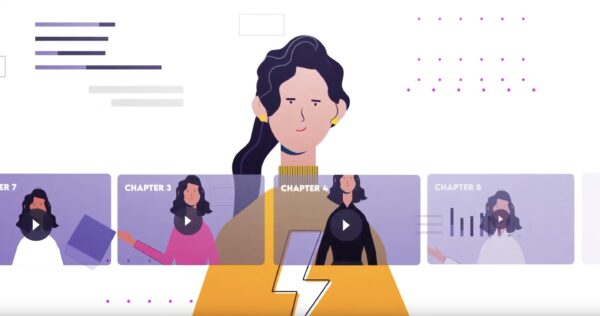Patrick Whatman ,Spendesk
“A lot of women stop negotiating at a certain point in the process because they’re afraid of not getting the job, or getting fired. And I always tell them, this is not the case. If you’re good at what you do, it will never cost you the role.”
When Jana Ludwig-Martyushev tells you about herself, it feels like she is multiple people at once… Not only is she the VP Finance at omni:us, an artificial intelligence service provider, but she is also the inventor of the Finance Toolbox, a playbook to help startups create their finance processes from scratch. And in her free time, she enjoys traveling, spending time with her family in Berlin, coaching women in finance, and addressing gender equality issues in the workplace – no biggie.
In this episode of the CFO Yeah! podcast, we spoke with Jana about her experience building the finance team from scratch at omni:us, managing productivity on a four-day work week, investing in yourself through side projects, and the gender gap in finance.
Buckle up, this episode is full of original (and sometimes surprising) insights!
Table of contents
1. Transforming the insurance industry with artificial intelligence
2. Managing the impact of lead time on planning and forecasting
3. Making finance a priority to support growth
4. Finance challenges at omni:us
5. The Finance Toolbox: a playbook to help startups build their finance processes from scratch
6. Tipping the scales for women’s financial independence
7. A four-day work week
8. More from CFO Yeah!
Transforming the insurance industry with artificial intelligence
“In the insurance industry, there are still a lot of dinosaurs. Their processes remain very manual. A lot of employees, a lot of bureaucracy… At omni:us, we leverage artificial intelligence (AI) to help businesses automate their full claims process, and we are the only company who offers a full scope, end-to-end claim automation product.
“When people have an accident, it usually takes several weeks until their claim is settled because of all the projects that need to be done manually. The insurance companies who use omni:us are able to settle their clients’ claims within 24 hours.
“Sometimes, it’s still hard to convince ‘old-fashioned’ companies to adopt AI, but luckily our Sales guys are quite talented. And normally, the CIOs of the companies we are talking to, or sometimes the boards or even the CEO, they all know they need to change. It’s pretty crystal clear that there’s no way around the need to be more digital. Once they are convinced, we start the process. But it takes a long time: we have a lead time of 18 months. Before selling, we need to talk to at least 30 people in one company. So, we need to sell our product 30 times.
“But we face resistance in departments like IT or claims. Of course they are afraid — their jobs are being taken away. In a lot of businesses, people are afraid of digitization and automation. But they know they have to change; we have had successful implementations in some companies already, but it’s a journey.”
Managing the impact of lead time on planning and forecasting
“Because our lead time is 18 months, we do need to be very good at forecasting and planning. We have to make sure that our pipeline is good, that we are not running into issues in the future that are foreseeable.
“18 months sounds like a lot, but if you see the total contract value of such kinds of companies, it’s very long. They don’t like change, so the contracts frequently last up to 15 years. When insurance companies implement one solution, they stick to it. So, the stickiness factor is high and compared to the lead time, it makes it ok. It’s a good balance.”
Making finance a priority to support growth
“Right now, the finance team is me, the VP of Finance, a senior accountant, and a senior controller. We are a very well established team now but initially, I started alone. It was me and the whole puncher I just bought the very first day I joined omni:us.
“Despite the fact that omni:us was already one year old when I joined, I saw the mistake that a lot of startups are making. The founders were focusing on business development, and finance was not a priority. But after one year, they understood that if they kept on working this way, we would fail. Without finance, we had no numbers. We could not make any decisions. Receipts were flying around…
“So, I implemented all the key processes, the structure. I put in place a base of ‘accounting hygiene’. Then, I hired a working student to help me with all the operational stuff. I also hired a junior controller. And one year ago, I decided to take the accounting in-house. I wanted to be able to make quicker decisions. It’s ok to start with a tax advisor, but when you’re going through a Series B you need to access information and data more quickly.”
Finance challenges at omni:us
“Currently, there are three areas I’m focusing on: finance, legal and compliance, and admin. In terms of finance, we are the business partner of the CEO, we help with things like fundraising, due diligence, talking to investors,…
“For the time being, I focus only on fundraising. And I’m super thankful to have a strong team because otherwise, this would not be possible. I’m currently preparing the data for our due diligence, talking every day to investors, answering questions about the financial model, the business plan and so on.
“And here, I see again how important it was to spend the time on setting everything up in a very clean and structured manner. Because now, I can really focus on the output. Secondly, as I mentioned, we are focusing a lot on controlling to get better analysis, to use the data we have. For example, we’re doing time tracking now to understand how much time the engineers spend on our customers, and how profitable our customers are.”
The Finance Toolbox: a playbook to help startups build their finance processes from scratch
“Joining omni:us, at the beginning, was quite overwhelming. Everything was a bit unstructured, so I started to clean up and to sort things out. My first focus was to handle the processes related to invoicing. Then, the second thing was cash and runway planning. We were not sure how long the money would last exactly.
“So, that was my second big priority, implementing cash planning and a budget. The forecast process didn’t exist at the time! And as I was Googling it, trying to figure out how to set up finances, I couldn’t find anything.
“But last year, as omni:us went on a four-day week, I decided to dedicate my Fridays to inventing a playbook and to help startups build up their finance processes easily. I ended up creating what is now known as the Startup Finance Toolbox. It consists of 10 chapters, with videos explaining processes. And for every video, you also have templates and guidelines.
“For instance, there are recommendations on how to find a good tax advisor, whom to hire first, and how to set up good accounting hygiene… It’s not reinventing the wheel, it’s just very small things that can help you react quicker. I’d say it’s a step by step process helping finance professionals and entrepreneurs create something valuable in a very easy way.
“My personal goal with this project is to help startups to survive. If you look at the numbers, nine out of 10 startups fail, and 20% of them do so because of finance issues. And I believe this world needs more startups…”
Tipping the scales for women’s financial independence
“I also work on a private heart project in the evening, when there is some spare time: I coach women in finance. I would say that doing so, I combine my professional experience with my passion. Because when I listen to all my girlfriends and family members, they always tell me the same things: ‘I don’t have money. I cannot save. I cannot do this. I rely on my husband.’
“So, I just help women take the fear away from the stock market. I help them set up a brokerage account, things like this. It’s a side project to make women more independent from their partners. In Germany, women are getting 50% less pension than men because of working part-time, taking care of kids, and parents getting lower salaries. I want to make sure they have enough money when they’re retired and have more time.
“Beyond personal finances, there’s also the topic of salary negotiation. Women are often very shy about that. I see it when I’m receiving applications at omni:us, for instance, what men are asking for salary and what women are asking for salary, despite the fact that they’re often better educated than their male competitors for this role. And they’re also too shy to ask for raises.
“So, I help them find arguments. I tell some women, when they apply at omni:us, that what they’re asking for is ridiculous. I’m very open with this, because I had this negotiation several times as well. I’m very stubborn, but I always got what I wanted. However, a lot of women stop at a certain point in the process because they’re afraid of not getting the job, or getting fired or whatever. And I always tell them, this is not the case. If you are good at what you are doing, it will never cost you the role.”
A four-day work week
“We decided to test the four-day work week last year. One reason was to extend the runway a bit, to be honest. We are still in this experiment and figuring out if we will continue or not. But I would say 80% of the employees loved it.
“I was so thankful to be able to use my Fridays for my own things. I would say productivity didn’t decrease. We reduced our meetings’ time. We put our focus on better managing time.
“And as I mentioned, 80% of our employees don’t want to go back to a five-day week, because you can use this day for yourself. A lot of people are doing their own projects, and a lot of them just take it for wellbeing, or for training or getting coached, acquiring a new skill, learning a language, things like this. I didn’t hear from anybody that they’re just Netflixing on Friday. So, everybody had something nice to share. And even if it’s a wellness day, it’s an investment in yourself as well.”
Curious??? Listen to it:


